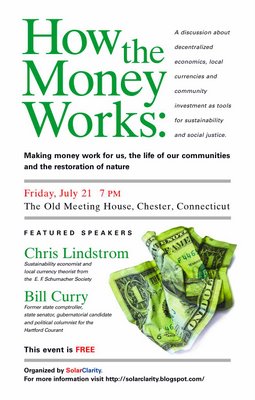This is a draft of a resolution acknowledging the challenge of Peak Oil/Gas and the need for Chester to prepare a plan of response and preparation. This plan was drafted by my working group SolarClarity and is based on similar resolutions passed by the San Francisco Board of Supervisors and Rep. Roscoe Bartlett’s Peak Oil Caucus in the U.S. House of Representatives. I've sent it out to a number of individuals and committees in town and it's starting to generate some good discussion, reflection, and a bit of hostility ('hey, are you a socialist?!').
I'm not exactly clear as to how much I want the local government involved with organizing relocalization, since I'm currently feeling a bit of frustration at the painfully slow way in which town committees respond to events and also how they tend to stiffle dialogue. But for the time being, the peak oil resolution idea is serving a nice purpose as a debating tool. It might be better just as a petition for people to sign and then to publish somewhere. i originally thought that the local government could formally make it part of its development vision, but i'm leaning more and more towards seeing sustainability as a grass-roots groundswell movement.
Chester Peak Oil Plan of
Response and Preparation
WHEREAS, The Shell Oil scientist M. King Hubbert accurately predicted that United States domestic production would peak in 1970, and thereafter would be depleted at a rate of between 4% and 8% per year;
WHEREAS, There is a scientific consensus that world oil production is nearing, or has already passed, its point of maximum production ("Peak Oil/Gas”) and will enter a prolonged period of irreversible decline leading to ever-increasing prices; and
WHEREAS, The United States has only 2 percent of the world's oil reserves, produces 8 percent of the world's oil and consumes 25 percent of the world's oil, of which nearly 60 percent is imported from foreign countries; and,
WHEREAS, The decline in global oil and natural gas production threatens to increase resource competition, geopolitical instability, and resource nationalism is increasingly dominating decisions of oil and gas development and trade relationships
WHEREAS, New England imports 90% of its energy and is increasingly vulnerable to massive power failures due to natural gas and petroleum supply shortages for electricity generation;
WHEREAS, The availability of affordable petroleum is critical to the functioning of our transportation system, the production of our food and of petrochemical-based consumer goods, sewage and waste treatment plants, the paving of roads, the lubrication of all machinery, and myriad other parts of the economy; and,
WHEREAS, Given that the energy density in one barrel of oil is the equivalent of eight people working full time for one year, our entire industrial (hydrocarbon-based) food production system is vulnerable to expensive oil;
WHEREAS, Chester is entirely dependent on electricity generated by external supplies of petroleum and natural gas as well as oil and gas for home heating; and
WHEREAS, In an period of increasing, and unavoidable, energy scarcity, Chester’s reliance on food and other basic life necessities which are produced thousands of miles away and transported via a shipping system which is itself dependent on cheap and reliable sources of petroleum, will put its economic and social well-being at increasing risk;
WHEREAS, Price signals of petroleum scarcity are likely to come too late to trigger effective mitigation efforts in the private sector, and governmental intervention at all levels of government will be required to avert social and economic chaos; and,
WHEREAS, The Department of Energy-sponsored study [ii] on mitigation of Peak Oil demonstrated that a twenty-year lead time is required for effective mitigation, while current measures supported by the federal government will replace only three-weeks worth of gasoline consumption by 2012 [iii]; and,
WHEREAS, Alternative sources of transport fuels from coal and natural gas both require high energy input and increase total carbon emissions, and biomass-based fuels compete with soil fertility, impacting agricultural sustainability [iv]; and,
WHEREAS, Substitution of petroleum with other fossil fuels threatens even greater damage to water, air, soil, and species diversity through their extraction and combustion; and,
WHEREAS, Because in conditions of energy decline and reduced mobility communities will be forced to rely ever more upon local resources, mitigating the unpredictable risks of Chester’s dependence on external sources of energy will require a collective project towards greater local economic self-sufficiency in the production of basic goods such as electricity and food;
WHEREAS, Chester has an abundance of natural resources, a rich diversity of citizens committed to maintaining Chester’s long-term viability, and a political culture of local civil servants dedicated to progressive and fearless leadership in times of great uncertainty and risk; now, therefore, be it
RESOLVED, That the people of Chester acknowledge the unprecedented challenges of Peak Oil; and, be it
FURTHER RESOLVED, That priority be given to (a) developing Chester’s ability to produce clean, renewable energy, (b) redeveloping Chester’s once abundant agricultural resources, (c) supporting local and regional networks of economic interdependency, and (d) economic development which emphasizes the fostering of import-replacing industries which produce essential goods and services for local consumption.
FURTHER RESOLVED, That the Board of Selectmen authorizes the creation of a Citizens' Commission to examine the issues raised by declining energy supplies and rising energy costs, to explore the needs and resources of the Town of Chester affected by energy costs and supplies, and to report back to the Board and to the citizens of Chester the results of its discussions and deliberations.
----------
[i] "The Role of the National Oil Companies in a Changing World:
Economic and Energy Relations", OPEC, 2004 at
www.saudinf.com/main/y7480.htm
[ii] Robert L. Hirsch, R. Bezdek, R. Wendling, Peaking Of World Oil
Production: Impacts, Mitigation, & Risk Management, February 2005,
online at
www.mnforsustain.org/oil_peaking_of_world_oil_production_study_hirsch.htm
[iii] www.eia.doe.gov/neic/brochure/renew05/renewable.html
[iv] L. Reijnders, "Conditions for the sustainability of biomass based
fuel use", Energy Policy 34 (2006) 863-876

